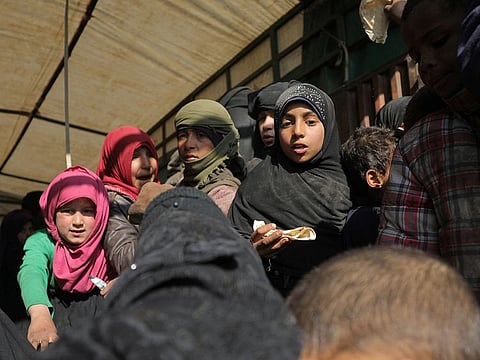2,500 foreign children in Syrian camps left in limbo
The children, including 38 unaccompanied minors, were from families associated with Daesh

Also In This Package
Beirut - More than 2,500 foreign children from 30 countries who have fled Daesh last redoubts are living in desperate conditions in camps in northeastern Syria, Save the Children said Thursday.
The charity urged their countries of origin to "take action to ensure the safety of their citizens" as US-backed forces battle Daesh in the final sliver of territory it holds near the Iraqi border.
"They need specialised help to recover from their experiences and return to normality, together with their families," the charity said.
"This is impossible in overwhelmed displacement camps in a volatile warzone. The international community must act now before it is too late."
It said the children, including 38 unaccompanied minors, were from families "with perceived or actual associations" with Daesh.
Also Read: English voice of Daesh comes out of shadows
They were separated from others in the camps, affecting their access to aid and services.
"Harsh winter conditions have left the camps in a desperate state, with children facing life-threatening risks," it said.
The children are "victims of the conflict and must be treated as such", said Sonia Khush, Save the Children's Syria response director.
"All states whose nationals are trapped in Syria must take responsibility for their citizens."
The charity said the children had already been deprived of adequate medical care and food for months or even years while in Daesh held areas, even before having reached the displacement camps.
"While some states have begun to do so, many countries - including several European countries - have yet to take steps to ensure the safety of the children and their families," said Khush.
"Given the life-threatening dangers these children and their families face in Syria, this is unconscionable."
Save the Children urged countries to repatriate the children and their families "for the purposes of rehabilitation and/or reintegration, in full compliance with international law, including the right to a fair trial where appropriate".
After years of battling Daesh and with all but a sliver of land left under group control, US-backed forces have detained hundreds of foreigners suspected of being Daesh fighters, as well as related women and children.
Syria's Kurds, whose fighters have been at the forefront of the battle, have long urged their home countries to take them back, but many nations have been reluctant.
US President Donald Trump has urged European governments to take back their citizens who fought for Daesh in Syria, but his administration said Wednesday it would refuse entry to a US-born IS member who wants to return from Syria.
The country's conflict has killed more than 360,000 people and displaced millions since it started in 2011 with the repression of anti-government protests.
Don’t leave children of foreign fighters in legal limbo: UN
Children of foreign fighters must have the right to belong to a country, lawyers and the United Nations said on Wednesday, after Britain stripped the citizenship of a teenage mother who travelled to Syria at 15 to join Daesh.
Children of foreign fighters must have the right to belong to a country, lawyers and the United Nations said on Wednesday, after Britain stripped the citizenship of a teenage mother who traveled to Syria at 15 to join Islamic State.
The fate of Shamima Begum, who was found in a refugee camp in Syria last week, has illustrated the ethical, legal and security conundrum that governments face when dealing with the families of militants who swore to destroy the West.
With Daesh depleted and Kurdish-led militia poised to seize the group’s last holdout in eastern Syria, Western capitals are trying to work out what to do with battle-hardened foreign jihadist fighters and their wives and children.
The U.N. children’s agency, UNICEF, said all children have “the right to a name, an identity and a nationality” according to international laws and governments had a responsibility to adopt safeguards that prevent a child from being born stateless.
“But where this occurs, those children need legal-aid and support to ensure no child is denied their right to citizenship,” UNICEF said in an email to the Thomson Reuters Foundation.
There is no reliable estimate for the number of stateless people globally although the U.N. estimates it could be 12 million and wants to end statelessness by 2024 as it can leave people with no access to basic rights like education and health.
Sign up for the Daily Briefing
Get the latest news and updates straight to your inbox




